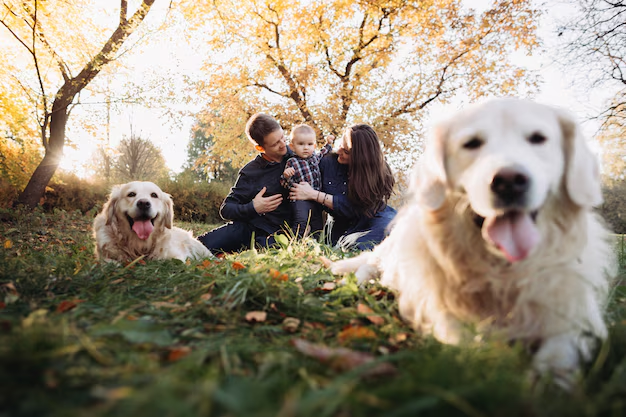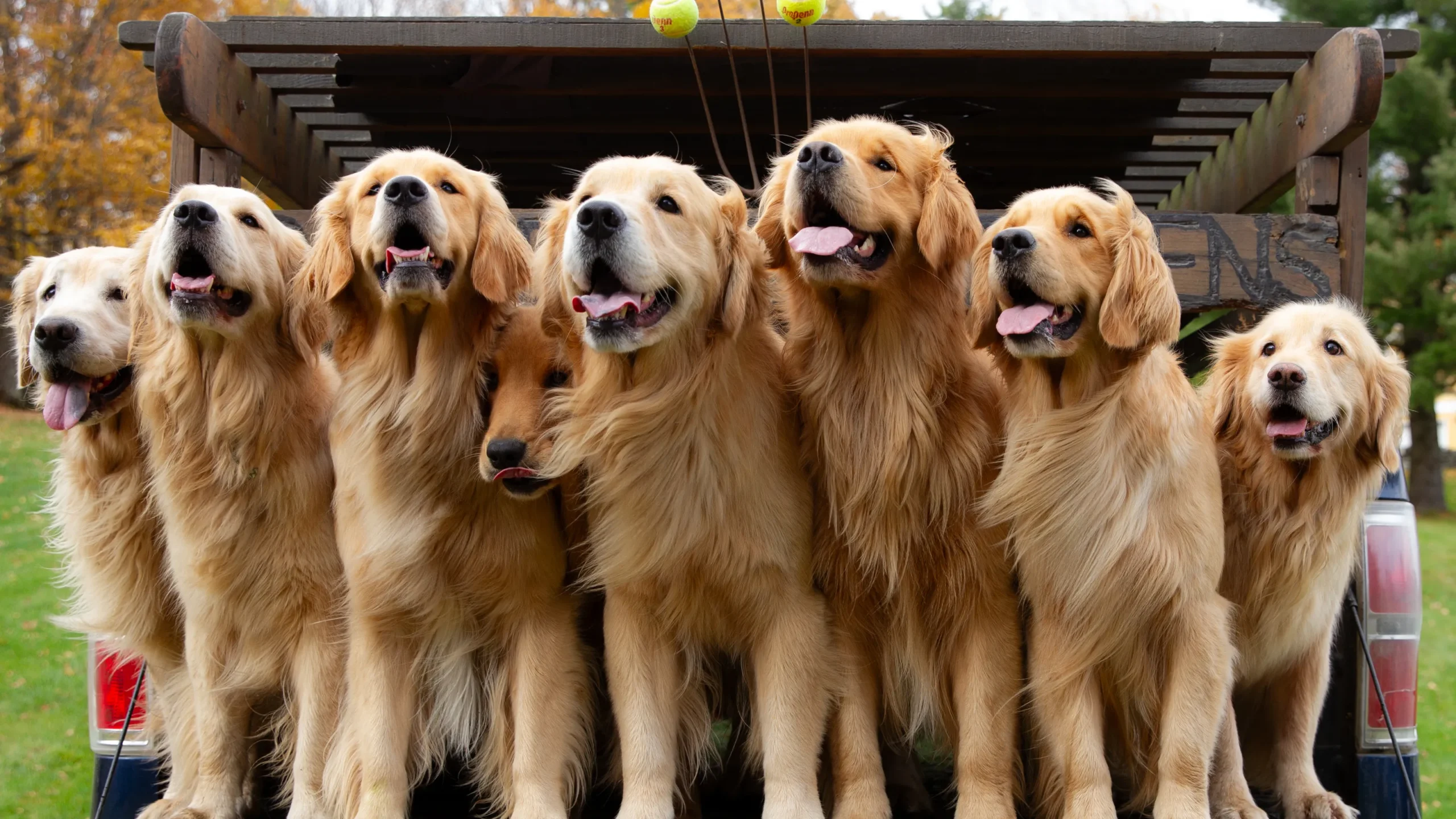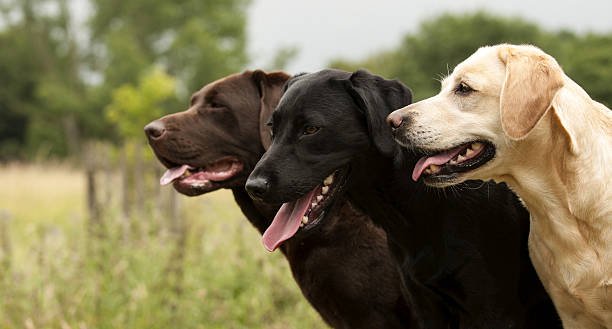Golden Retrievers are one of the most popular dog breeds in the world, known for their friendly nature, intelligence and loyalty. These dogs are excellent companions for families, individuals and even service dog programs. However, before adopting a Golden Retriever, it’s important to understand the breed’s specific needs, temperament and care requirements.
In this blog post, we’ll explore what makes Golden Retrievers so special and what you need to consider before bringing one into your home. By the end, you’ll have a clear idea of whether a Golden Retriever is the right fit for your lifestyle.
1. Temperament: Friendly, Loyal, and Social

One of the standout characteristics of Golden Retrievers is their incredibly friendly and sociable nature. They are known to be gentle, tolerant and great with children, making them ideal family pets. Their loyal and eager-to-please personality also makes them excellent working dogs, frequently serving as guide dogs for the visually impaired, therapy dogs or in search-and-rescue roles.
Why Their Temperament Matters:
- Family-friendly: Golden Retrievers are patient and friendly with kids, making them great pets for families of all sizes.
- Social animals: They love being around people and other animals. If you lead a social lifestyle or have other pets, this breed will fit right in.
- Separation anxiety: On the flip side, their social nature can make them prone to separation anxiety. Golden Retrievers don’t do well when left alone for long periods. If you have a busy lifestyle that requires you to be away from home for long hours, you’ll need to ensure someone can provide attention or consider doggy daycare.
2. Exercise Needs: High Energy and Playful
Golden Retrievers are a high-energy breed that thrives on regular exercise. These dogs were originally bred to retrieve game during hunting, so they have a lot of stamina and need plenty of physical and mental stimulation.
Daily Exercise Requirements:
- 1 to 2 hours of exercise: Golden Retrievers need at least one hour of exercise each day, though many may need closer to two hours, especially younger dogs. This can include walks, runs, playing fetch or swimming (a favorite activity for many Goldens).
- Mental stimulation: In addition to physical exercise, Golden Retrievers also need mental stimulation. Puzzle toys, obedience training, and interactive games are great ways to keep their minds sharp.
- Dog sports: Activities like agility training, dock diving, or advanced obedience can be fun outlets for their energy and intelligence.
If you’re an active person who enjoys the outdoors, a Golden Retriever may be a perfect companion. However, if you’re more sedentary, you’ll need to make adjustments to meet their high exercise needs.
3. Grooming and Shedding: A High-Maintenance Coat

Golden Retrievers are known for their beautiful, thick, double-layer coats. While their coat is stunning, it does require regular grooming to keep it healthy and reduce shedding. Golden Retrievers are moderate to heavy shedders, so it’s important to be prepared for a fair amount of fur around your home.
Grooming Tips for Golden Retrievers:
- Brushing 2-3 times a week: Regular brushing helps to remove loose hair, dirt, and prevent mats from forming. During heavy shedding seasons (spring and fall), daily brushing might be necessary.
- Bathing every 4-6 weeks: Bathing helps to keep their coat clean and shiny. However, avoid over-bathing, as it can strip their coat of natural oils. Always use a dog-specific shampoo to prevent skin irritation.
- Ear cleaning and nail trimming: Golden Retrievers are prone to ear infections because of their floppy ears. Regular ear cleaning is essential, as is trimming their nails every 4-6 weeks.
Be ready to invest time and effort into grooming your Golden Retriever. If you’re not up for regular brushing and cleaning, this may be something to consider before adopting.
4. Health Considerations: Common Health Issues
Like all purebred dogs, Golden Retrievers are prone to certain genetic health conditions. While they are generally healthy dogs, it’s essential to be aware of these potential health issues before adopting.
Common Health Concerns for Golden Retrievers:
- Hip dysplasia: This is a common issue in larger breeds like Golden Retrievers. It occurs when the hip joint doesn’t fit properly into the socket, leading to arthritis and mobility issues as the dog ages.
- Elbow dysplasia: Similar to hip dysplasia, this condition affects the elbow joint, leading to pain and decreased mobility.
- Cancer: Unfortunately, Golden Retrievers are known to have a higher rate of cancer than many other breeds. Regular vet check-ups and early detection are crucial for managing this risk.
- Heart conditions: Golden Retrievers can be prone to heart disease, particularly subvalvular aortic stenosis(SAS), which affects blood flow from the heart.
- Allergies: Some Golden Retrievers may develop food or environmental allergies, which can manifest as itchy skin or digestive issues.
To minimize health risks, it’s essential to adopt from a reputable breeder who tests their dogs for these common issues. Additionally, keeping up with regular vet visits, providing a balanced diet, and ensuring your dog gets plenty of exercise will go a long way in maintaining their health.
5. Training: Intelligent and Eager to Please
Golden Retrievers are highly intelligent and trainable, which is one of the reasons they’re often used as service dogs. They’re eager to please their owners, making them quick learners, especially with positive reinforcement techniques. Early and consistent training is key to raising a well-behaved Golden Retriever.
Training Tips for Golden Retrievers:
- Start training early: Begin training your Golden Retriever as soon as you bring them home, whether as a puppy or adult. They’re quick learners, but bad habits can form if you delay training.
- Use positive reinforcement: Golden Retrievers respond best to positive reinforcement methods such as treats, praise, and playtime. Avoid harsh corrections, as this can damage their trust and make training more difficult.
- Socialization: Proper socialization from a young age is critical to prevent behavioral issues. Expose your Golden Retriever to a variety of people, places, and other animals to ensure they grow up to be well-rounded, confident dogs.
Even though Golden Retrievers are eager to learn, they can sometimes become distracted due to their curious nature. Patience and consistency are key when training them.
6. Golden Retrievers and Family Life

One of the reasons Golden Retrievers are so beloved is their adaptability to family life. They are incredibly affectionate and bond closely with their human family members. They’re particularly known for being gentle with children and can thrive in active households.
Family-Friendly Traits:
- Affectionate and gentle: Golden Retrievers love to be involved in family activities and will often follow their owners from room to room. They are gentle, even with young children, and rarely display aggression.
- Active and playful: Their high energy levels make them great companions for kids and active adults who can keep up with their playful nature. Games like fetch and tug-of-war will be daily activities in your household.
- Protective yet friendly: While they’re not aggressive guard dogs, Golden Retrievers will alert their family to unfamiliar visitors. Their protective instincts are balanced by their friendly nature, meaning they’re more likely to greet strangers warmly than aggressively.
However, it’s important to note that their playful energy can sometimes lead to knocking over small children or elderly family members. Supervision is recommended when they’re playing with vulnerable individuals.
Conclusion
Golden Retrievers are loving, loyal, and intelligent dogs that make wonderful companions for families and individuals alike. However, before adopting a Golden Retriever, it’s important to be prepared for their exercise needs, grooming requirements, and potential health issues. They require regular care, attention, and interaction to thrive, making them an excellent choice for those who can commit to meeting their needs.
If you’re ready for an energetic, affectionate, and loyal friend, a Golden Retriever may be the perfect addition to your family. With proper training, grooming, and care, you’ll enjoy many years of love and companionship with this amazing breed.




